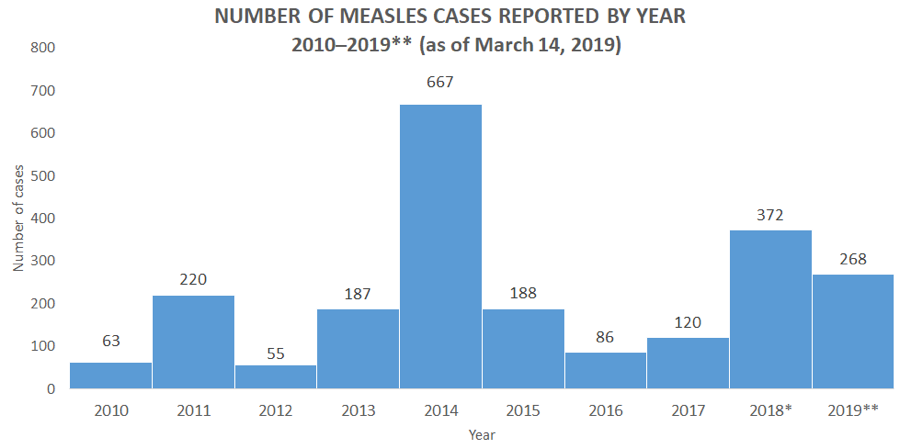Start a public health degree at American Military University. |
By Dr. Carol Hoban
Faculty Member, Public Health, American Military University
With the resurgence of many vaccine-preventable diseases like polio and measles here in the United States, we in public health must work harder to educate the public on the importance of vaccinations and immunizations for both children and adults.
The Advisory Committee on Immunization Practices (ACIP) recommends routine vaccinations for children and adults to prevent 17 vaccine-preventable diseases.
There are schedules for both children and adults listed on the CDC website.
Measles Outbreaks Prove the Need for Regular Immunizations
Recent outbreaks of measles have shown that vaccinations against such diseases are effective and necessary. In 2018, there were only 17 measles cases in the U.S., according to the Centers for Disease Control and Prevention (CDC). Most of those cases involved three separate outbreaks in New York State, New York City and New Jersey, primarily among unvaccinated members of Orthodox Jewish communities.
However, the CDC now reports that there have been 971 measles cases so far this year in the United States. The numbers may continue to grow, as the virus is highly contagious and can live in the air and on surfaces for up to two hours.
Large-Scale Vaccinations Establish ‘Herd Immunity’ against Diseases
When the majority of a population is vaccinated against a certain disease, we establish “herd immunity,” which helps prevent the spread of that disease. However, many states permit parents to exempt their children from vaccinations for non-medical reasons. As a result, we lose that herd immunity and susceptible populations can experience outbreaks of those diseases.
According to a Public Library of Science (PLOS) Medicine article, since 2009 the number of non-medical exemptions for vaccinations has increased in 12 of the 18 states that allow non-medical vaccination exemptions. Those states are:
- Arkansas
- Arizona
- Idaho
- Maine
- Minnesota
- North Dakota
- Ohio
- Oklahoma
- Oregon
- Pennsylvania
- Texas
- Utah
The authors of the article also cite a study that found a significant negative correlation between the states that allow non-medical exemptions and the lower rates of disease outbreaks in states where residents are vaccinated against measles, mumps and rubella (MMR).
In 2000, the United States was free of measles. However, just a few short years later, 37 cases were reported in 2004. Now, according to an article in MDLinx, the number of measles cases is again on the rise.
Content source: National Center for Immunization and Respiratory Diseases, Division of Viral Diseases (CDC)
Whooping Cough and Influenza: Other Preventable Diseases That Are Becoming More Prevalent
Pertussis or whooping cough is another vaccine-preventable disease that is on the rise. The CDC found that the number of pertussis cases increased in 2017 from the previous year.
For example, two states experienced significant outbreaks of pertussis in recent years:
- California reported 9,934 persons were infected during an outbreak in 2014.
- Washington state had an outbreak that involved 2,530 cases in 2012.
Influenza is yet another vaccine-preventable disease that unfortunately claims many lives each year as the result of complications from the flu virus. The CDC reported that 7.7% of all persons seeking medical care in the U.S. in 2018 had experienced flu-like symptoms. That made last year the worst influenza season since the 2009 swine flu pandemic.
Public health agencies play an essential role in providing vaccinations and immunizations for many diseases, including influenza, measles, hepatitis C and pertussis, to name a few.
Educational materials for healthcare providers, public health officials and the general public are available on the CDC website.
Vaccinations have long been proven to be safe, with minimal risks and no scientific evidence linking vaccines to autism. However, with the loss of herd immunity in the population becoming more and more prevalent as parents exempt their children from immunizations, we may be facing more widespread outbreaks of disease in the future and the resurgence of diseases that we haven’t seen in many years.
About the Author
Dr. Hoban earned her Ph.D. in cellular molecular biology and physiology from Georgia State University in 2008. She earned her MPH degree in 1997 from the Rollins School of Public Health at Emory University.
Dr. Hoban has worked in maternal and child health and vaccine-preventable disease. She was the project director for the Pregnancy Risk Assessment Monitoring System (PRAMS) in Georgia for over six years and was also the project director for the Georgia Immunization Study for over seven years. Dr. Hoban has numerous publications for her work in both vaccine-preventable diseases and maternal and child health. She is also currently a peer reviewer for the Maternal and Child Health Journal.


Comments are closed.